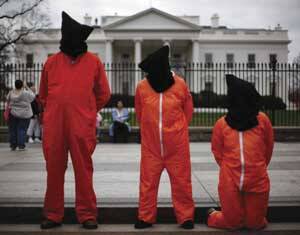We Americans have a clear and definite legal duty to investigate and prosecute the crime of torture. Under the 1949 Geneva Conventions, each party is “under the obligation to search for persons alleged to have committed or to have ordered to be committed, such grave breaches [of the duty not to torture], and shall bring such persons, regardless of their nationality, before its own courts.”
Similarly, the 1984 Convention Against Torture requires each party to “ensure that its competent authorities proceed to a prompt and impartial investigation, wherever there is reasonable ground to believe that an act of torture has been committed in any territory under its jurisdiction.”
Our nation is a party to these and other treaties prohibiting torture and mandating investigation and prosecution.
We know that high officials in the Bush administration violated these treaties. We have unimpeachable documents confirming that individuals taken into custody since Sept. 11, 2001, were waterboarded and worse. The controversy over whether waterboarding is torture is entirely specious. In fact, the United States has prosecuted Japanese military personnel at the end of World War II, American soldiers during the Philippine Insurrection, (1902–13) and others for waterboarding.
Investigating and prosecuting such crimes is obligatory; it is not a “witch hunt,” as some charge. Nor is it something optional—a matter of “prosecutorial discretion”—that the president may choose to forgo.
The only issue is whether the Obama administration will follow the violations of the Bush administration by a violation of its own.
Senator Patrick J. Leahy, Democrat of Vermont, proposes a truth commission to look into the scandal. We should praise him for his courage. But a truth commission will not meet our obligations as a nation, which are to hold violators judicially accountable.
Some think that recent domestic legislation prevents the United States from fulfilling its obligations in the aftermath of torture. The presence or absence of specific domestic legislation is, however, irrelevant to our nation’s duty. After World War II, during the trials in Nuremberg and Tokyo, the United States prosecuted individuals for what the United States judged to be wrong, even if arguably authorized by German or Japanese law.
We also hear that torture committed since 2001 by U.S. personnel is not illegal because it violates “only” international law. Treaty obligations are, however, part of the law of the United States. The Constitution specifically provides that treaties are the “supreme” law of the land. International law prohibitions on torture are the law of the United States. Moreover, the prohibition on torture is a peremptory norm of international law—a higher norm that cannot be changed by merely changing a treaty. The concept of peremptory norms owes much to Catholic natural law scholars, including St. Thomas Aquinas.
Government lawyers produced thousands of pages of legal memoranda on the subject of torture and international law, ironically demonstrating how serious these international law obligations are. Some now—incredibly—contend that prosecution is not possible because of the existence of these same memos.
In fact, officials who act in reasonable and good faith reliance on legal advice may be immune from prosecution. The advice in the memos, however, is anything but reasonable. The memos are full of basic errors. They do not focus on what the law requires of interrogators but rather on how to avoid prosecution; as such, judges are unlikely to permit the memos as evidence at trial. The lawyers who prepared the memos cannot credibly contend that they acted in good faith in their preparation. Nor do the memos address what should be our greatest concern: the liability of superiors who authorized the use of torture or failed to prevent it.
Former officials insist that “harsh interrogation” produced essential intelligence, but such advocacy cannot change the fact that torture is morally and legally wrong. When judges and jurors see the techniques at issue demonstrated, they will recognize them for what they are. No president can change these facts.
Finally, some argue that even if the use of torture is wrong, interrogators may rely on an affirmative defense of “necessity.” The Geneva Conventions and the Convention Against Torture, however, reject necessity as a defense for torture.
America’s obligation to investigate and prosecute is clear. Other countries are obligated to prosecute if ours does not. Some cases are already under way. But this is fundamentally our nation’s duty. If we Americans do not prosecute our own perpetrators, in addition to compounding our wrongdoing, we weaken our right to demand that others end a practice that our church rightly teaches is intrinsically evil.








